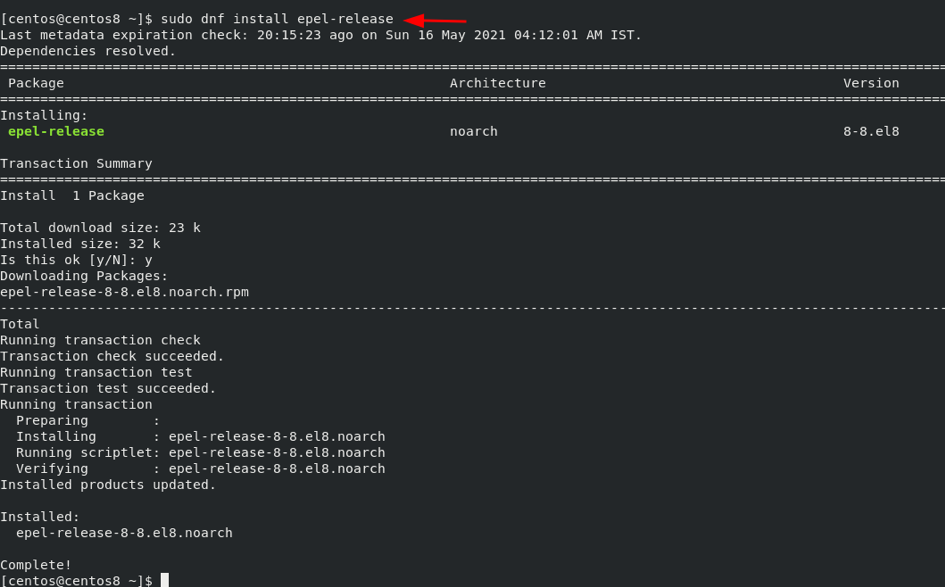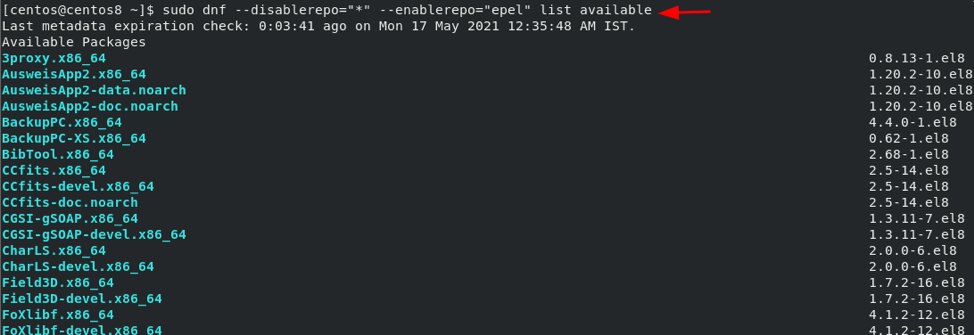This guide will show you how to install and enable the EPEL repository and access its packages in CentOS 8.x.
Requirements
For this guide, you will require the following:
- REHL/CentOS
- Sudo or root privileges
How to Install EPEL Repository on CentOS 8
Installing the EPEL repository on CentOS is very simple. Follow the steps illustrated below:
Step 1: Start by searching the EPEL repository as shown in the command below:
The above command will give a sample output as shown below:
Last metadata expiration check: 8:50:41 ago on Sun 16 May 2021 04:12:01 AM IST.
============================== Name Matched: epel ==============================
epel-release.noarch : Extra Packages for Enterprise Linux repository
: configuration
[centos@centos8 ~]$ clear
[centos@centos8 ~]$ sudo dnf search epel
Last metadata expiration check: 8:50:47 ago on Sun 16 May 2021 04:12:01 AM IST.
============================================================================================================================== Name Matched: epel ==============================================================================================================================
epel-release.noarch : Extra Packages for Enterprise Linux repository configuration
You can get more information about the package by using the command:
This will give you an output as shown below:
Last metadata expiration check: 20:13:32 ago on Sun 16 May 2021 04:12:01 AM IST.
Available Packages
Name : epel-release
Version : 8
Release : 8.el8
Architecture : noarch
Size : 23 k
Source : epel-release-8-8.el8.src.rpm
Repository : extras
Summary : Extra Packages for Enterprise Linux repository configuration
URL : http://download.fedoraproject.org/pub/epel
License : GPLv2
Description : This package contains the Extra Packages for Enterprise Linux (EPEL) repository
: GPG key as well as configuration for yum.
To install the epel-releases packages on CentOS 8, call the package manager as shown in the command below:
This will install the EPEL packages as shown in the image below:
How to Verify EPEL Repository
To confirm the EPEL repositories are enabled and installed on your system, you can use the commands:
sudo dnf repolist
This will list all the available repositories, including EPEL, as shown in the screenshot below:
Search and Install Package in EPEL
To install a software package provided in the EPEL repository, use the command as:
To view the list of packages in the EPEL repository, use the command:
This will list all the available packages in the EPEL repository, as shown below.
To locate a specific package in the EPEL repository, simply pass the output to grep as shown (searches for qbittorrent package)
The output is as shown below
Conclusion
In this tutorial, you learned how to enable and install the EPEL repository on CentOS 8. Feel free to try the process as illustrated in the tutorial and see if it is helpful to your needs.




